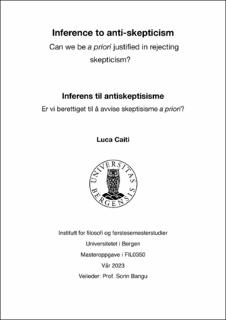Inference to anti-skepticism: Can we be a priori justified in rejecting skepticism?
Master thesis
Permanent lenke
https://hdl.handle.net/11250/3082234Utgivelsesdato
2023-05-30Metadata
Vis full innførselSamlinger
- Master theses [32]
Sammendrag
In the following thesis, I will discuss the topic of radical skepticism and deal with abductivism as a possible anti-skeptical strategy. I will argue that abduction—or, Inference to the Best Explanation (IBE)—can be utilized as an epistemically valuable strategy against the skeptic. I shall focus on simplicity and will offer my own account of a priori ontological simplicity, based on the view called “rationalist abductivism”. I will defend the position that the “brain in a vat” is less simple than the commonsense hypothesis. Along the way, I will argue that the abductive principle of simplicity, together with a number of other considerations, provide an epistemic justification for believing in the commonsense hypothesis; moreover, I will note that the BIV skeptical hypothesis actually assumes, even if just implicitly, the existence of an external world. First of all, I will present the skeptical argument (in chapter 1), and then discuss some of the major anti-skeptical strategies (in chapter 2). Then, in chapter 3 I will discuss abductivism and Vogel’s approach. Next, I will face several objections to abduction and abductivism (chapter 4). Finally, in chapter 5, after the discussion of some relevant suggestions and BonJour’s approach, I will present my own account, followed by my reply to some possible objections to it.
